We’re going to go track-by-track through Forward Into Battle, but first I’d like to ask you how the band felt going into the recording of the album. Because at the time it was pretty risky for a punk band to do something so overtly metal, wasn’t it? “Yes, it was very early days for the punk/metal mix… we were still listening to (or should I say we’d always been listening to) Discharge, Rudimentary Peni, Bad Brains… a lot of the songs you hear on Forward Into Battle were actually written before the (preceding) To the Ends of the Earth EP, so we’re talking about a very ‘early days’ punk/metal fusion. It was the beginning of that scene, so you’ll still hear a lot of the things that influenced the first English Dogs LP (1984’s Invasion of the Porky Men), or even stuff I wrote when I was in The Destructors in 1981-83”.
So let’s talk about what you remember about the recording and writing of each song. First up is the instrumental intro, always listed as Forward Into Line. “It’s not actually called Forward Into Line, it’s called Forward Into Battle. I don’t know where the hell the ‘line’ thing came up; It’s a classic case of a record label registering the album and giving a track the wrong name. That instrumental has the sort of hook you might hear in a detective series, where you’re watching and you hear it and think ‘something shady’s going on!’. It was something that I came up with. It sounds early, so there’s every chance it’s actually something I came up with when I was writing for The Desecrators. Me and Jon (Murray, the Dogs’ other guitarist) did have a way of coming up with riffs and you can hear it on FiB. They have a definite sort of sound. The English Dogs punk/metal sound that has a little bit of Iron Maiden in it but also has elements of Show No Mercy, Kill ‘Em All and Bonded by Blood in it”.
The first ‘proper’ track is Final Conquest. “Yeah, I’m really proud of that one. It’s another early one that I came up with the music for and Pinch (drummer, now plying his trade with The Damned) wrote the lyrics. Lyric-wise the theme that meant a lot to us was anti-war: But we didn’t just want to do the same kind of stuff that everyone else was doing. We were concerned about war, but we didn’t want to just sing about World War three. So we weren’t always writing about the fear of war, we wanted to write about war that had already happened. Final Conquest was one of those lyrics. Musically it’s one of those really early mixes, with Discharge and Rudimentary Peni (as I was listening to those bands a lot), but it’s total heavy metal. It’s really about our love of the English punk scene but also the emergence of American thrash metal. There’s a lot of Slayer and Metallica in there too. In the solo section there’s a melody in there that really moves around which I was and am really proud of”.
At this point Gizz reveals he has a stereo handy with demo versions of the tracks cued up for us to listen to, so that he can check if his memories of the recording stand up to close scrutiny. He’s happy that in this instance we do, so we move on to the next track, Ultimate Sacrifice. “Jon came up with such a good riff. It was a long one, and the way Pinch handled it on the drums, putting all these accents in, made it really dynamic. It starts off with one of Pinch’s first double bass drum ideas, then it takes off, and gets faster, which was a great effect. Thematically it’s about martyrdom; there’s a section in the middle, a crazy rhythmic section, that was really adventurous for us. It’s like a shuffle rhythm, almost like The Four Horsemen but played faster and with our own crazy riff in the middle… “
It sounds like you were very keen on experimentation within the band, on seeing just how far you could go with ideas. “We were very open to other stuff, and we might take something, speed it up, slow it down. We were ready a lot; we were big fans of Crass. As I said there were a lot of bands saying the same stuff and we just didn’t want to do that. At times it was like somebody was policing the scene, making sure everybody said the same thing and we didn’t want to be part of that”.
Any scene is the same when it becomes saturated though. Those second and third generation bands just don’t have the same inspiration or, often, talent. “Yes. I’m listening to this track now and there are loads of little interjecting hooks at the end of lines, which I don’t think you’d have heard coming from other bands at that time. We were listening to a lot of Loudness at the time, who were a Japanese heavy metal band who musically were just insane. They were doing the same thing. We didn’t have the best gear, but we’d always hear things on other records and go ‘let’s try that!’. We were pushing ourselves, on shitty gear”.
The next track is Ordeal by Fire. “The lyric was written by Jon, which I didn’t know until recently. It’s a war theme again, but this time it’s medieval. And when you hear the song it’s got an opening that sounds a tiny bit like Diary of a Madman but then it goes into this kind of medieval, folk melody, which came out by pure chance. The first four songs on the album, along with Wall of Steel are my favourites. This one has a very strong chorus, one of my favourite choruses in the whole of English Dogs’ recordings. It changes key, which is really nice. The pre-chorus just chugs away on a chord and then it lifts up. I love that. And then in comes another medieval melody – one of my favourite English Dogs things. It’s an anthem. We were doing a lot of things with accents at the time in the band – Almost a prog rock thing. It’s playing with numbers. It’s the dawn of mathcore!”
The next song is False Prophet. “Correct. That’s probably the earliest song on the album. Written for my band The Desecrators, which was my early punk/metal band, before this period in the English Dogs history. Let me just have a quick check of the melody! It sounds like it’s got a bit of a horror vibe to it, and the theme of the song is based around an American evangelical character; It’s about an evangelical false prophet. It’s got a bit of a Motörhead thing going on there, but also there’s a blatant Bad Brains rip off! It’s really just a punk riff metalled-up. A hardcore riff with lots of dampened chugging – the beginning of metal punk! It’s probably my best solo on the album, certainly the most tidy. You can hear the Van Halen in there!”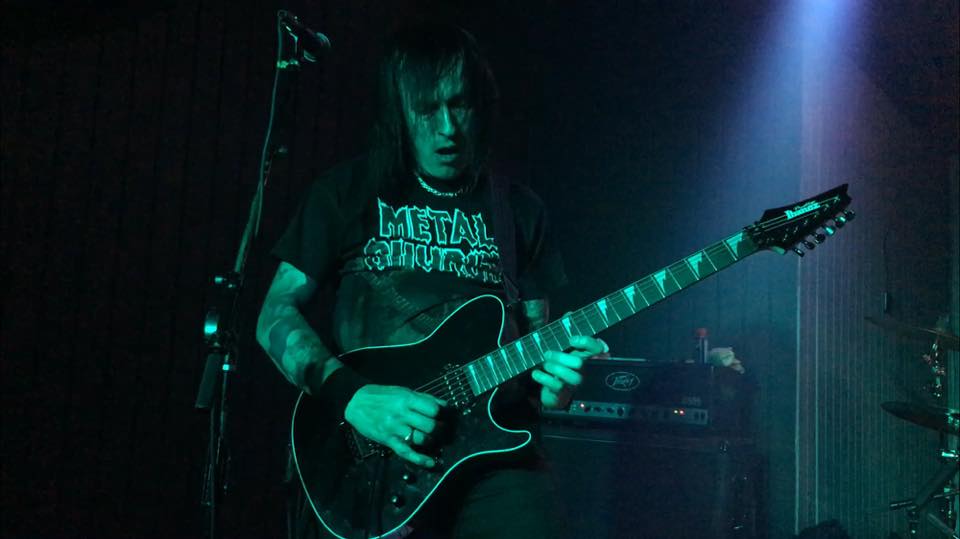
What guitar were you using on this album? “I had this awful Fender. Well, actually it wasn’t that bad. It’s just that in those days I didn’t know anybody that could set it up to play at its best. I also had an Ibanez SG55, which appearance-wise looked like a Gibson SG (Note for non-guitar buffs reading this – like Angus Young’s guitar – Ed.), which was a good slab of wood. It had a twenty four fret neck, which was unusual, but soundwise it was a bit thin because I didn’t change the pickups. I just didn’t have the knowledge”.
Wall of Steel is next. Your favourite? “Yes. Again an early song, I may have written before I joined English Dogs. Not the lyrics, but definitely the music. I love everything about that song”.
At which point fate interjects, with some peeping electronics in the Butt homestead bringing an end to the conversation rather abruptly. We agree to reconvene at a mutually convenient time, with Gizz undertaking to give the album another thorough going over with a view to reporting back with any other thoughts on the tracks we’ve already covered. A week later we take up the story again…
Over the week he’s been immersing himself in the record. Lots of memories, it seems, have been prompted. Good memories? “One of the first things I noticed, starting off with Final Conquest, reading through the lyrics, it sounds very much about the story of Adolf Hitler. There’s a lot more to these lyrics than what I initially thought. Ultimate Sacrifice is about a cult leader; a Charles Manson or David Koresh type sending his people into mass suicide. Ordeal by Fire is a story similar to what terrorists are doing today, suicide bombers. Stealing the flame is an old story, but the story has relevance to modern times. And that song really led the way for (next album) Where Legend Began. Like the track Forward Into Battle there’s an awful lot of Ride the Lightning in there. When that album came out it blew our minds! And we can’t deny the influence on Forward into Battle. Also the Exodus album Bonded by Blood, which had been out for months as a demo called A Lesson in Violence. At the other end of the spectrum The Ruts album The Crack – Babylon’s Burning, Staring at the Rude Boys – we were listening to that as well. Them and Killing Joke were just as much of an influence. Listening to this again made me realise just how much these influences were on us”.
What about the song Nosferatu? “I would say for me, on this album that that’s the biggest grower”.
I know what you mean – now, when I go to Forward Into Battle it’s probably the track I go to first, which might not have been the case at the time it came out. “Because it’s a grower! It’s definitely the most Exodus-influenced on the song. It starts in F, which for a guitarist is unusual. You don’t write many songs in F. Why would you when there are other great keys like E?”.
So why decide to write one in F? “Because someone – a local guy – told me this story about Budgie writing in F. We’d heard of Budgie because one of their tracks (Breadfan) was on the b-side of the Creeping Death twelve inch. This guy was a local musician and producer who we all really respected, and he explained why they did it, how they would play in F, take their finger off the fret and create a weird sounding E to F hammer on effect. We thought we could do it, so we tried it. We then added a solo in E and the ending is in E so it’s just one of those musical things we tried in those days, things we were open to”.
What about He That is Bound, Shall Be Freed? “It’s got a theme that recurs, almost in a classical style. Apart from second hand classical ideas that we might get from other bands… Bolero was creeping into Am I Evil, that kind of thing – you didn’t hear much classical music around. But I grew up listening to Rachmaninov from an early age, also Rimsky Korsakov. And I was trying to get that into songs. I was just taking from the things that were closest to me, and turning them into riffs. On top of that in this song, Pinch really wanted to get a Motörheady, Overkill kind of thing going. We were all trying to get things in there”.
But increasingly the names you are mentioning here are metal. So apart from Discharge, Bad Brains and The Ruts, were none of your punk contemporaries really influencing you at this point? I always feel The Varukers were close relatives, musically to you, if nowhere near as proficient. “We appreciated the Varukers, but felt what they did was a bit second hand. If you listen to anyone, from that time, I always feel that maybe Stiff Little Fingers were close to us! They, like us, worked within very tight recording budgets, Jake Burns would have been a fan of Thin Lizzy and the other guitarist, Henry Cluney, who wasn’t as proficient but still just as important. You can see the similarities! Jon Murray was an important guitarist and a great riff writer and the two of us bounced off one another all the time. Then of course there’s the Damned. When Love Song came out, we wondered how they could play so fast. And of course, our great friends GBH, and the UK Subs, who we toured with, played with and socialised with, both could be said to mix heavy rock with punk, so it’s all in there somewhere”.
What about Five Days to Death? “I believe that (vocalist) Adie wrote the lyrics to that song and He That Is Bound… I wrote the lyrics to False Prophet, Jon wrote Ordeal by Fire and most of the others were written by Pinch. He could write a good lyric! Five Days to Earth had one of those intros… There’s definitely a hint of Ozzy in that. Revelation: Mother Earth and Diary of a Madman are both in there. Again there is a classical overtone in Randy Rhoads’ playing on those and we stole it!”
The final track is Brainstorm. “I remember at the time seeing Edward Van Halen on TV and thinking ‘how can a man have a hand stretch like that?’. That scared me! I was walking into WH Smith’s and looking in guitar magazines and seeing people like (Night Ranger guitarist) Jeff Watson doing eight fingered tapping. I’d never heard it, but I’d seen pictures of him doing it, so when I get home I’m thinking I’m going to see if I can do it. So I started coming up with these weird licks, but I still hadn’t heard any of my contemporaries doing it. Then I saw Stanley Jordan on (TV Show) The Tube doing a version of Eleanor Rigby just before we went into the studio. That was the first time I’d seen someone use all eight fingers tapping to play a song. So on Brainstorm, there’s tapping all the way through the song, but for the riffs, and the ideas for the riffs, I’d have to give a nod to Voivod. The idea behind Brainstorm is that of a war in someone’s head. For the first time in our lives we were taking LSD, and we were aware of what acid can do to you, that kind of thing. That one was going all over place but we liked it, and it worked!”
And it’s good way to end the album isn’t it? “It is a good way to end the album! Years later we had a chance to revisit the album, and we toured the whole album. We tidied it up a little bit. At the time we recorded it, at that age, we had ideas in our head but we didn’t know how to execute them. As you get a little bit older you develop a few tricks, and learn how to execute. So I was happy that we managed to get ourselves together and do that. When I look back now, and think of the songs… Final Conquest – very happy with that, Ultimate Sacrifice – I love that song, I love Ordeal by Fire, Wall of Steel, Nosferatu… at the time I thought why do we have to make these songs so hard, but like you said over the years it becomes something else and I’m so glad we did make it! It’s really enjoyable to listen to and I think we did OK”.
Where does it sit in your own personal canon? Is it one of your favourite albums to have been involved with? “Yes, of course it is, definitely. Not only is it one of my favourites, it’s one of my favourites to play. When I get up on guitar, I love playing those songs. At the moment English Dogs are on a bit of a holiday, and I don’t know how long that will last because we were getting on top of one another a bit. But if we do, I’d love to do that album again because it’s great fun”.



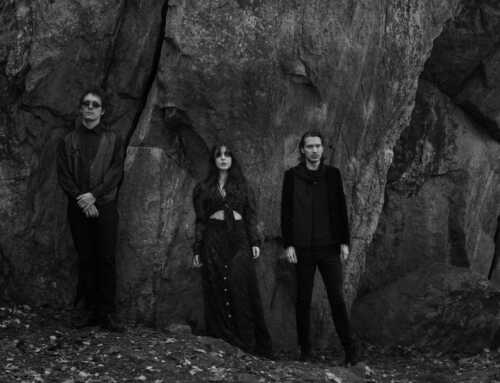
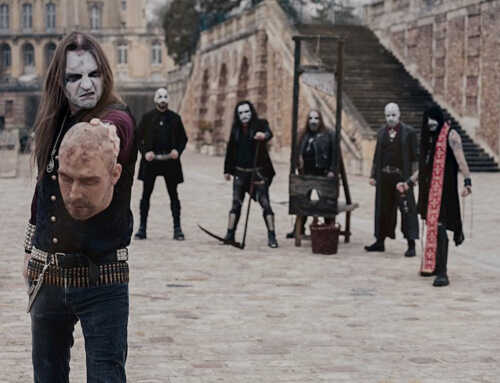
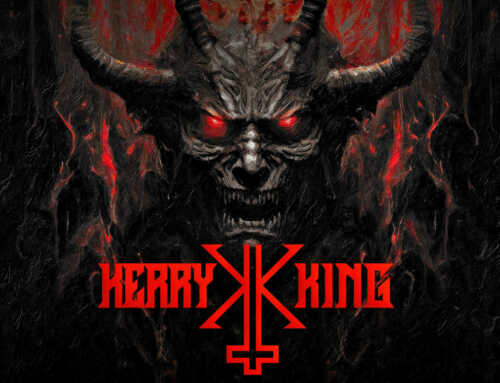
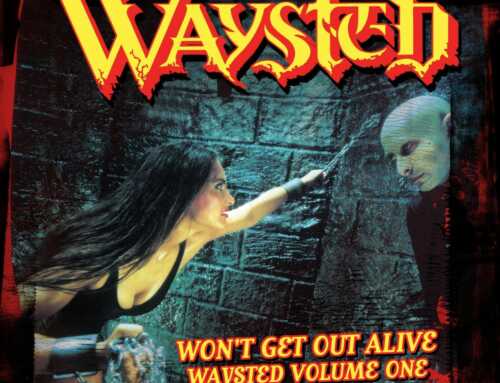
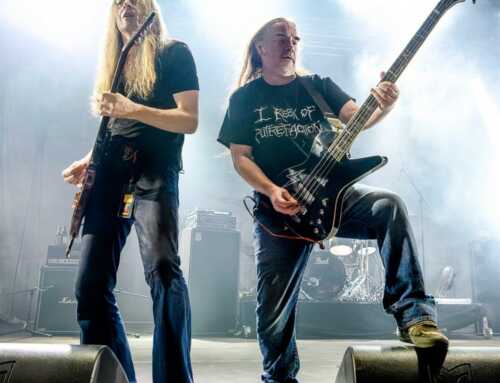
Leave A Comment